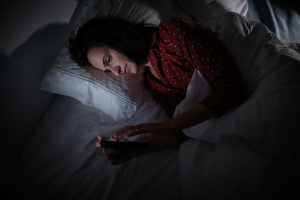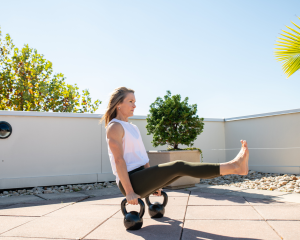Earth Day is almost here and it’s the perfect time to think about spending more time outside. Getting out in nature has been shown to improve cognitive function, brain activity, blood pressure, mental health, physical activity, and sleep.

Despite the evidence for the benefits of the outdoors, Americans now log more time indoors, in front of a screen, on average, than we do sleeping. If you could replace 30 minutes of screen time a few days a week with a brisk walk, workout, or meditation, would you? If you took an inventory of the number of minutes you spend on an average day on your phone, computer, or television, do you believe you’d be surprised?
More alarming recent statistics are below:
- The average American spends 7 hours and 4 minutes staring at a screen per day.
- Americans spend an average of 3 hours and 43 minutes on their phone per day.
- A user clicks, taps, and swipes their phone 2,617 times daily
- 43.5% of users unlock their phones between 51 and 100 times each day
- 87% of users check their smartphone within 1 hour before going to sleep and after waking up, and a lofty 69% of users do so within 5 minutes

We are tethered to our devices. They have become an essential part of our lives.
Have you ever misplaced your phone and felt consumed by anxiety at the thought of being disconnected from the world? You know that feeling when your phone battery dies, and you immediately drop everything to get the charger?
As a society, we have become addicted to our phones – and frankly, screens of all sizes and purposes. It is where we work, shop, communicate, play, and much more.
Many of us have a fear of missing out (affectionately known as FOMO), prompting incessant checking of email, social media, and news updates. We crave connection and feeling in the know, and our phones are our lifeline.
I think we can all agree that the desire for connection and community is important and a necessary part of being human. However, your digital cord can become a barrier to achieving the fitness and wellness you desire.
Your digital cord:
1) Reduces (and replaces) the amount of time you reserve for wellness and fitness. When we spend our free time, lunch breaks, etc., on our phones, it may feel like we are always busy. Yet, that time spent scrolling and checking could be spent on our wellness. Checking emails, checking news, checking in with friends… is a never-ending loop that can leave us with little time to spend on our wellness practices.
2) Reduces the quality and/or quantity of your sleep. Blue light from our screens reduces melatonin (the sleep hormone) and stimulates the brain to stay awake. This may make it harder to get to sleep, or worse yet, lead to awakening in the middle of the night.

Additionally, we take the last bit of information we absorb to sleep with us. So, our last few thoughts – whether pleasant like a funny meme or unsettling like a last-minute email from the client – we are what we bring to bed, making for tough nights of disturbed sleep, with awakenings, frustration, and added stress, all because of the content we last viewed.
3) Leads to constantly comparing yourself to others. Comparing ourselves to others’ fitness and wellness is unproductive. It can also lead to more insecurities and negative self-talk.
4) Can make you feel like your time is being stolen. The obsession with our devices causes us to waste our precious time. Imagine if just one of the hours spent on our phones each day were instead used for self-care activities like exercise, meditation, a walk in the woods, or spending time on a hobby or skill.
Here are some tips to cut your digital cord:
- Swap 1 to 10 minutes of phone use each day for conscious breathing, walking, meditation, or your preferred pause button from the stress of the day. This can even be in thirty-second intervals. Thirty seconds can add up!
- Set reminders to get off your phone or social media after a certain number of minutes/hours per day.
- Set time limits on your phone at the beginning and end of the day to serve as reminders it is too early or too late to be scrolling.
- Check email ONLY at specific times during the day. Try to refrain from email conversations. The stress in your brain remains high while we are on eternal email.
- Turn off your phone at a certain time at night.
- No blue light in your bedroom.
Learn more strategies to take charge of your health and wellness in my Small Group Concierge Wellness program, where you will find supportive conversation and movement practices in a group of like-minded women.



